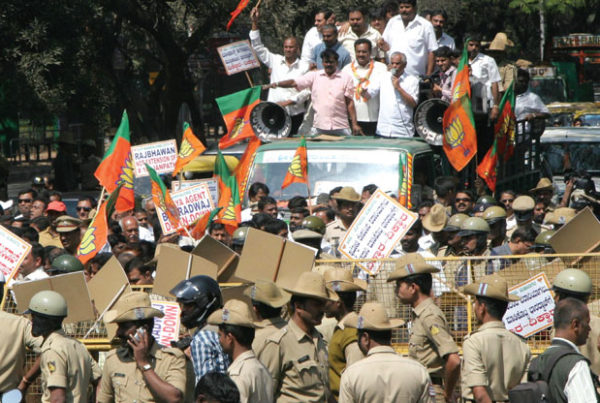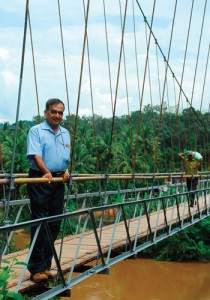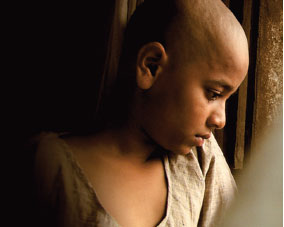 Since the BJP came to power, there
Since the BJP came to power, therehas been an escalation in the
violence faced by women
TEN HOURS and a reversal of roles. At 12 noon, I was listening to women share details of how they were assaulted on the streets of Bangalore. By 10.30pm that night, I was on the other side. In three weeks, there have been eight incidents of assaults on women on the streets of Bangalore. In this unfolding theatre of violence, we have been spat on, slapped, kicked, punched, verbally humiliated, pulled off buses, our clothes tugged at. All of this for wearing jeans. For our sleeveless shirts. For talking back in English, Hindi, Kannada. For rolling our eyes. For not responding to taunts. For walking the streets alone. There can be no end to explanations of why any of us were attacked.
Ask 32-year-old artist Geethanjali, about explanations. On 17 February 2009, at 1pm, she got into her car to drive home after her German language classes at the Goethe-Institut or Max Mueller Bhavan in upmarket Indiranagar. Within minutes, she noticed two men on a bike hooting and dangerously over-taking her car. Her only reaction was to turn on to the main road. “On the main road, I was counting on more traffic and hence people on the roads in case things got worse,” says Geethanjali. Despite the increased presence of people, the bikers continued with their taunts — they drove up next to her and spat on her window. “It was then that I gestured angrily at them and their unprovoked action. It made matters worse,” she says, “They blocked my path, hurled abuses at me in Kannada, and started banging on the window.”
Seizing an opportunity to escape from the scene, Geethanjali attempted to drive away, grazing the bumper of the bike. She was chased to a friend’s apartment close by, punched, and verbally assaulted for over 10 minutes. As she finally escaped to safety, the men attacked her car with a huge stone.
The police maintain that the assault on Geethanjali was entirely her fault — it was a result of the road accident that she ran away from. An explanation she hardly agrees with. “It is an easy for the police to say that — something they can comprehend. They don’t hear me when I say that the assault began as soon as I left the Institute,” she says.
Jasmine, a journalist with a local publication, took another route. She refused to face wayward explanations by deciding to not address the press or go to the police. “I do not want to talk to the cops as, even with hardcore evidence, the police didn’t do anything about the Mangalore episode and those hooligans are out. I do not want to talk to the press and be anyone’s political scapegoat,” she says in a written handout. Jasmine’s words capture a barely controlled anger. On 24 February, at 11am, she was attacked for 15 minutes by four men on a busy street. They attempted to lift her shirt and pull her jacket off to demonstrate to a crowd that she was wearing “indecent clothes.” She was rescued by some armymen.
Hours after the attack on Jasmine, another woman, 28- year old-filmmaker Lakshmi, was attacked in Vasanthnagar near central Bangalore. Around 9 pm, four attackers rained blows on her as they abused her for wearing jeans. Four days after the attack on Lakshmi, in the same area, I was attacked on my way home from an evening concert at 10.30 pm. Since my car had a flat, I was walking towards an autorickshaw on the main road when two men on a motorbike slowed near me and landed a solid punch on my right jaw. I remember yelling abuses seconds before I was punched. I remember lunging at the shirt of the pillion rider on the bike — an effort that didn’t go entirely wasted. The men lost control of the bike and fell a few feet away. A second later they had whizzed off even as I continued yelling in a flood of languages — Kannada, English, Hindi — anything those men could hear. The autorickshaw driver was gesturing madly, asking me to get in. I stood and counted the number of people around me who could have helped — seven including the autorickshaw driver. Had even one capitalised on the fall of the bikers, I would have had a better chance at punching the men back. I would have had a bike registration number to report at the police station I went to immediately.
There have been several other incidents. A young woman who was pulled off a bus. A group of women who were beaten up because they dared to raise their voice against men who were driving rashly. What explanations can there possibly be for these attacks? None can cover all the attacks that have taken place recently in Bangalore. The only sane explanation that I can think of is that we were all attacked because there was an easy opportunity to do so.
There is an unmistakable climate of fear (and accompanying anger) that cloaks Bangalore today. It isn’t a fear that comes from the realisation that women are suddenly more prone to assaults. Five minutes of conversation with garment workers going home, municipal cleaners who leave home at 4am, students taking buses, young professionals in corporate houses and several thousand others will bring forth stories of sexual harassment or ‘eve-teasing’. I overheard a friend asking another, “So what’s the big deal? Hasn’t this always happened to women everywhere?” I couldn’t agree more. A preposterous comment. It only underlined how violence on the streets and in public spaces has become part of the ordinary or “normal” for women everywhere. Just that there are a few women today who are refusing to take it easy and forget about it.
BUT THAT isn’t where the fear comes from. It stems from being part of a city where the Police Commissioner, Shankar Bidari, brazenly looks askance when asked about the lack of security. Bidari, the man at the helm of the police department, today insists that “all Bangaloreans are cultured and respect women wholeheartedly” and that “the three reported incidents are stray cases of simple eve-teasing.” (Only three women have filed police complaints). Women in Bangalore, according to Bidari, are safe and more importantly, feel safe given the cosmopolitan nature of the city. Ask him about deterrent action, about publicising the fact that violence on women is a crime punishable under law. In return, we get lectured about not helping the police by writing down bike registration numbers “even though we had enough time.” A few hours later, Bidari accuses us of lying: “We have to first establish that the victims are stating the truth.”
Bidari isn’t alone in adopting this stance of nonchalance. Since the BJP Government came to power in May 2008, there has been an escalation in the violence faced by women. In the last four months alone, there have been more than 80 reported incidents of violence against women. The BJP’s tacit support to Sangh Parivar organisations like the Bajrang Dal has emboldened them and others like them to ignore the laws of the land.
VS Acharya, the Home Minister of Karnataka, when asked about the recent attacks in Bangalore, wanted to know why the media was bringing this to the notice of the Home Minister! This was after all a trifling matter — not one of great importance at all. A reaction that hardly evinces any surprise given if we consider the continuing attacks on women in Mangalore and coastal Karnataka. After the now-much publicised attacks on pub-going women in Mangalore, the government issued condemnation statements, but in the same breath spoke disapprovingly of the “degenerate pub culture”. Wasn’t this tacit support? What explanations were there when Ashwini Mulay, a young student, committed suicide, unable to bear the harassment followed her talk with a Muslim boy? The Sangh organisations have moved on — they are now attacking Muslim women who wear the hijab.
These statements and actions of the Police Commissioner and the Home Minister have stoked the ongoing protests by Nirbhaya Karnataka, a collective formed in response to the recent attacks on women. In their endeavours to reclaim public spaces and to demand safety for all women, a series of events are planned in Bangalore and other cities. To present Nirbhaya Karnataka as efforts of a certain class of women who are responding when attacked would be unfair. Violence on women in public spaces isn’t a class crisis and — any response to that cannot be one either.
In the absence of a support mechanism, we lost Ashwini. The only hope there can be is that hers is the last loss we will suffer.
All names of victims have been changed
—
This article was originally published in Tehelka, a leading independent news magazine in India, known for its investigative journalism.


